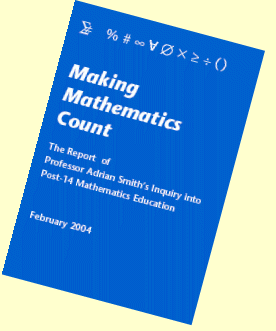Editorial
This issue's Pluschat topics
- The permanent revolution - The government's response to Adrian Smith's Inquiry into post 14 mathematics education
- A-levels - Are the ever-improving results a sign of falling standards?
The permanent revolution

Probably no one in the education sector is looking forward to yet more change. But with severe shortages of maths teachers and the prospect of worse to come as many retire in the next decade, doing nothing is not an option for the government.
In 2002, the Department for Education and Skills [DfES] commissioned Professor Adrian Smith, Principal of Queen Mary, University of London, to lead an Inquiry into post-14 mathematics education. Published in February this year, the report, "Making mathematics count", hit the headlines for its recommendation that maths teachers be paid more - considerably more - than teachers in other subjects. He estimated that 1 in 7 maths lessons are taught by someone unqualified, and that to rectify this situation, almost 3,800 specialist maths teachers would need to be recruited.
The DfES's 52 page response has now been published, and the government has indeed, for the first time, shown itself willing to pay teachers differentially according to their subject areas. It is increasing both the grants to trainee maths teachers and the golden hellos paid to new maths teachers by £1,000 (from £6,000 and £4,000 respectively) and lifting the cap on the salaries of Advanced Skills maths teachers, as well as guaranteeing them at least £40,000 per annum. Although these measures do not go as far as Smith's recommendations, he professes himself delighted, and says that the headlines generated will start to change the perception of teaching as a relatively poorly paid career for maths graduates.
Between 2000 and 2003, the number of students taking A level maths fell by around 10,000 - approximately one sixth. Although the figures just released for 2004 show a slight upturn, there is certainly no room for complacency.
A levels

So which interpretation is correct: smarter, better-educated students, or easier exams?
The more you think about it, the more you realise that an objective assessment of changing standards is extremely difficult. The same exam can't be given each year, for obvious reasons, so instead experienced exam-setters attempt to set questions of "equivalent" difficulty. Already, judgment calls are being made. Then, when the exam scripts come in from marking, typically some questions turn out to have been answered better or worse than expected. Again, judgment must be exercised: were students surprisingly poorly prepared for those questions, or were the questions easier or harder than had been intended?
And what should the exam markers do in this situation? If they rescale the results so they match expectations - which are based on the judgment that this year's students are about as smart and well-taught as those in previous years - they may be accused of a cover-up. But if they don't, students, employers and universities face great difficulties. Students may lose out on university places, or universities may find they have greatly over- or under-offered, and both universities and employers will find it very hard to compare applicants who left school in different years. There will also be unacceptable differences between students who took different subjects, or papers on the same subjects from different exam boards, or who answered different questions on the same paper.
As exams assume ever-greater importance, it is hardly surprising that ambitious young people try harder than ever to do well in them, leading to increasing numbers with very high grades applying to take prestigious courses at prestigious universities. This leads to complaints from the hapless admissions tutors who have the miserable job of selecting between these candidates, and who lead the charge that exams are getting "too easy".
But isn't it ridiculous that we are, in effect, worrying that there are "too many" top students? The problem is surely one of limited supply, rather than of too great demand for places. Although the number of places at third level institutions has increased along with the number of students wanting to study at this level, much of the expansion has not been in the institutions regarded (rightly or wrongly) by students and employers as the most desirable. The situation is surely that staple of classic economics: rising prices (ie higher results needed), caused by supply not matching demand.
If you have anything to say about these or any other topics that might be of interest to Plus readers, e-mail plus@maths.cam.ac.uk. Let us know if you are happy for your email and our response to be published in Plus. (We may edit emails before publication.)